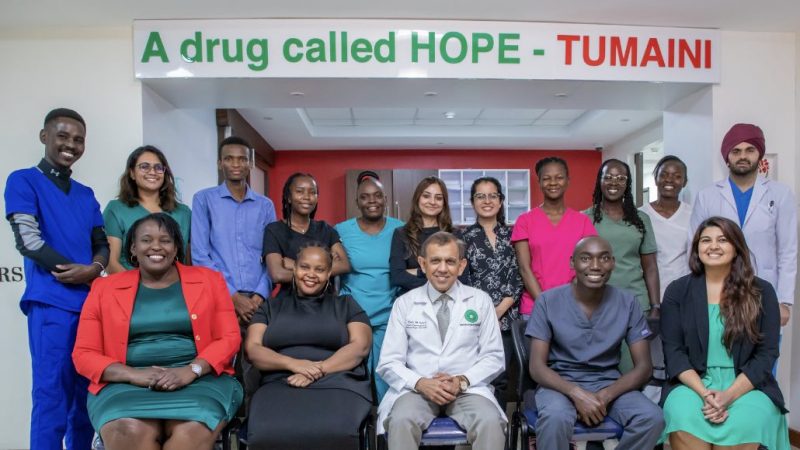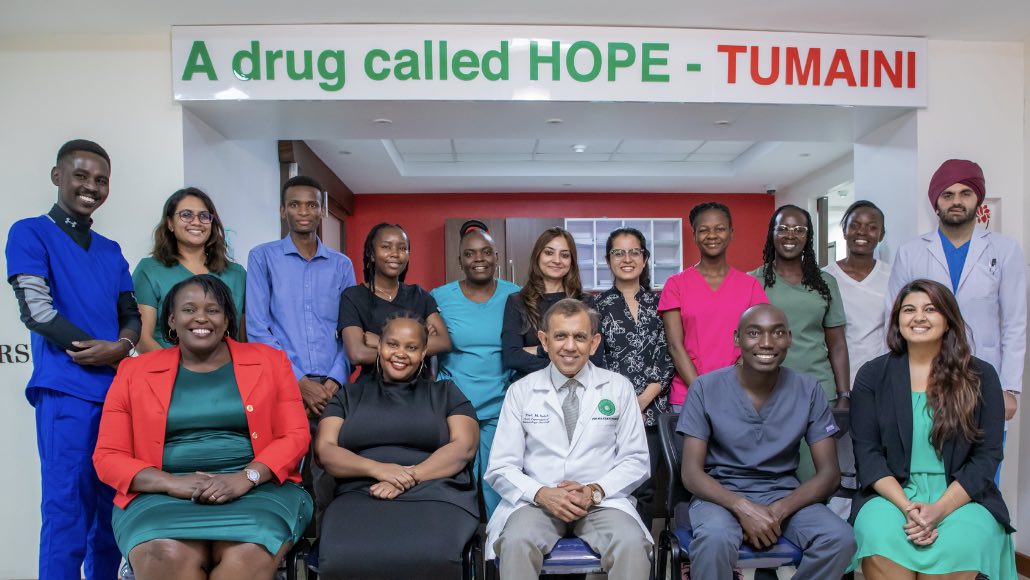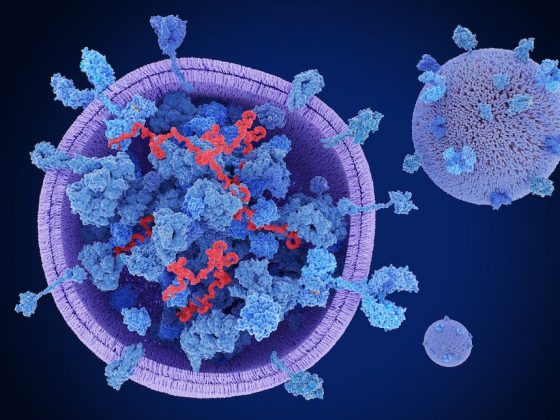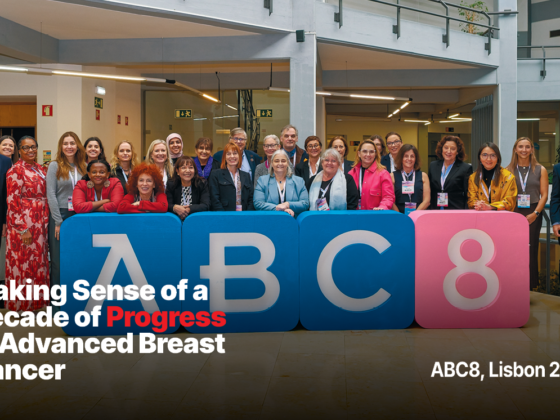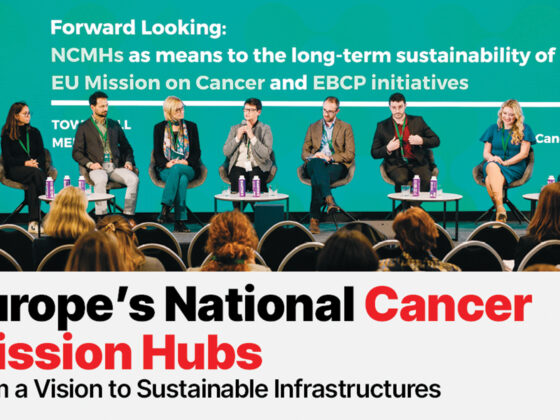Four years ago, clinical trials were little discussed in oncology circles in Kenya. In common with the rest of East Africa, there was no clinical research unit to study treatments for non-communicable diseases such as cancer.
No cancer patient living in Kenya had ever been offered experimental therapies as part of a trial in their home country. Now, for the first time, hundreds are being enrolled in two centres in Kenya; information about recruiting trials in breast, lung and oesophagus cancer clinical trials is appearing on social media platforms, and specialists are hosting medical webinars to promote awareness.
This feels like a game-changer, and for Mansoor Saleh, founding Chair of the Department of Haematology-Oncology, and Director of the Clinical Research Unit at Aga Khan University Hospital in Nairobi (pictured above), it is long overdue. “Africa has been left behind,” he says. In Sub-Saharan Africa, the odds of surviving cancer – as measured by the cancer mortality to incidence ratio – is around half that in high-income countries. The need for research to begin to close that gap is particularly urgent, he argues, given that cancer is the fastest-growing health threat in the region.
“Our population is growing and getting older. Our diet from healthy farmed food is changing to processed carbohydrates, which contributes to obesity. We are more sedentary and have more exposure to environmental toxins. And there are also the effects of climate change. All these in some way affect our risk for disease and we in Africa need to study patients in Africa who are exposed to these stressors. We cannot use data generated in the West from Western populations who suffer different stressors and have a different genetic makeup,” he says.
For years, pharmaceutical and biotechnology companies have been pumping their clinical research money into developed countries. Africa accounts for a very low percentage of global clinical trials, with estimates putting it at about 2.5%. A 2020 review of the clinical trials posted on ClinicalTrials.gov showed only 26 cancer-related interventional trials in Africa, of which only six were being conducted in countries with predominantly Black patients.
That picture does seem to be changing. The Swiss-based pharmaceutical company Roche, for instance, which has a large presence in the oncology market, told Cancerworld it currently has 61 trials running in African countries, two thirds of which are in oncology. While these include North African sites – Morocco, Algeria, Tunisia – they also include Sub Saharan sites in Ghana, Kenya, Nigeria, Uganda, and South Africa.
A strategic imperative
Ramping up clinical trials capacity and investment is seen as a strategic priority by AORTIC, the African Organisation for Research and Training in Cancer. A meeting of clinical triallists they organised in Maputo in 2019 drew up a list of recommendations covering areas such as good clinical practice, ethics, and regulatory issues; design, conduct, and analysis of Phase I–IV clinical trials; drug discovery and development; and opportunities to scale up.
AORTIC President Miriam Mutebi, a breast cancer surgeon at the Aga Khan University in Nairobi, says clinical trials in the continent will help answer some of the most pressing questions around the therapeutics that will work best for patients.
“Clinical trials are a very important part of cancer research. They will help look at whether a drug makes a difference in patient care,” she says. “Because disease outcomes and drug responses can vary across populations, research must include patients who are racially, ethnically and gender-representative of those who experience disease. It also addresses barriers to clinical trial participation, diversifying genetic data for scientific discovery.”
It is this need to learn about how drugs and protocols developed in and for primarily white populations perform in African populations that Saleh sees as a particular priority. “[The genetic subtypes] are different from the North American or European subtypes. Our studies with African patients thus contribute to data to determine whether these drugs work on our patients and whether the toxicity profile is different from that of patients seen in the West. Thus far, our data has shown that the genotype of our cancer patients is different than those in the West. This has implications on both toxicity and efficacy,” he says.
Precision cancer medicine for Africa
One of the trials Saleh singles out as significant to making progress in cancer treatment in Kenya is a Roche trial relating to the treatment of patients with early or locally advanced/inflammatory HER2-positive breast cancer. The trial arms all involve treatment with pertuzumab and trastuzumab. The question being asked is whether patients prefer the drugs to be administered intravenously at a hospital (which takes around 6 hours not including travel), or by subcutaneous administration at home, using ‘Phesgo’, Roche’s novel injectable formulation, (which takes around 10 minutes).
Sceptics might ask how much impact such a trial would be likely to have on clinical practice and outcomes in Kenya, given the cost of those monoclonal antibodies, particularly in the injectable form. Saleh disagrees.
“We either accept Western data blindly or be part of contributing new knowledge about the applicability of these drugs in African patients”
“If we do not test a drug like Phesgo in Kenya, we will never know if it works for our patients. Thus, we either accept Western data blindly or be part of contributing new knowledge about the applicability of these drugs in African patients… If we had used the same logic of doing trials in Africa, we would not have ART [antiretroviral therapy] for our HIV patients, who now pay a very nominal cost for a formerly very expensive drug combo.”
The issue of cost is a political question that should be posed to Roche and the Ministry, he says, adding that “We clinicians provide evidence for benefit,” and that having that data allows clinicians a seat at the table to be part of those discussions about access.
Saleh’s arguments are strongly endorsed by Mary Nyangasi, who previously ran the oncology programme at the Kenyan ministry of health, and now leads the WHO global breast cancer work.
Very little data from patients in low-and middle-income countries (LMICs) – typically less than 5% – is incorporated at the clinical stage of drug development, she says. “Given that these are targeted therapies working at specific molecular targets to deliver personalised treatment… it only makes sense to begin to work towards better engagement of individuals in LMICs for better evidence generation, and possibly an investment case for this, demonstrating improved survival and potential cost savings.” This work is all the more important, adds Nyangasi, as the world moves to precision oncology and public health precision medicine. “We will need these local institutional datasets to contribute to the global space and generate molecular data from LMIC settings for future cancer diagnostic and therapeutic biomarkers.”
Paving the way for precision cancer medicine

Legend: BC – breast cancer; HER2+ – human epidermal growth factor receptor 2-positive; TNBC – triple-negative breast cancer
Source: Abimbola F Onyia et al. (2023) Breast Cancer Phenotypes in Africa: A Scoping Review and Meta-Analysis. JCO Global Oncology, volume 9 (Figure 2). Reproduced under Creative Commons Attribution
Non-Commercial No Derivatives 4.0 License
Saleh also points out the significance of investigating options for delivering treatment by subcutaneous injection, at home in the context of a country with a large rural population and few hospitals able to administer chemotherapy infusions, which places big barriers to patients completing their course of treatment. “One day soon it may be administered at home. That is progress, and that is what an African patient in the rural areas where there is no clinic will need. It will be convenient to our patients, increase treatment adherence, leading to better outcomes,” he says.
“One day soon it may be administered at home. That is what an African patient in the rural areas where there is no clinic will need”
As Saleh points out, this sort of clinical research would be very hard to finance without the help of pharmaceutical companies, who cover the cost of not only the treatments, but the diagnostics, and even the patients’ costs for food, transport and accommodation.
Building a clinical trial culture
While oncology leaders such as Saleh, Nyangasi, and AORTIC may be convinced of the importance of expanding clinical trial capacity in the region, they recognise that it may require some effort to win public trust. Cultural, and religious beliefs, and suspicions that trials are about using patients as ‘guinea pigs’ affect enrolment in drug trials. A strong advocacy effort is needed to promote conversations around the opportunities these trials offer to access cutting edge treatments, and the role they play in making progress towards improving survival.
Saleh also comments on a lack of commitment among some investigators to see clinical research as a worthy personal academic endeavour, even though all drugs used by the same clinicians were previously experimental agents, and patients – as well as clinical investigators – contributed to this knowledge. “It is our responsibility to do the same for the next generation of African patients,” he says.
Regulatory bottlenecks also pose a problem. Approvals by the government take long, taking away the competitive edge that Kenya would have with pharmaceutical trials. The continent also has limited trained personnel.
“We have initiated a clinical investigator training programme to train nurses and physicians to become clinical investigators”
Saleh is happy, however, with the progress being made at the Aga Khan University Hospital Clinical Research Unit. “From six staff members, now we have 20, and we have initiated a clinical investigator training programme to train nurses and physicians to become clinical investigators. Over the past four years, we have trained nearly 100, and many have gone on to become researchers. This is our contribution to capacity building in sub-Saharan Africa,” he says.

Aga Khan University ©
At one clinical research unit in Kenya, for instance, about 300 patients have enlisted across 15 research trials. “Our highest enrolling study of 165 participants has maintained a greater than 90% retention of participants. The key is patient compliance and completion of all protocol activities and follow-up.”
Currently, most of the therapeutic clinical trials are on breast, lung and oesophageal cancers. Prostate cancer and hepatocellular carcinoma drug trials are expected soon.
From clinical trial to clinical practice
As the current leader of AORTIC, based at Nairobi’s Aga Khan university, Miriam Mutebi is delighted at the progress in building clinical trials capacity in Kenya and other countries of Sub-Saharan Africa. But she is also deeply immersed in discussions on the government’s overall cancer policies, and therefore highly focused on all the different elements in the patients’ diagnostic, treatment and care pathways that need to come together for the evidence gained through clinical trials to translate into better outcomes in the real world.
Access to cancer precision medicines remains a big hurdle, she says. “[Clinical trials] will provide access to some medications that a select group of patients may not necessarily have. However, a bigger discussion needs to be held around how we as a region or as a country procure the drugs.” Many countries in Africa end up paying prices that are several times higher than the prices paid in countries at similar levels of economic development, for instance in Latin America. “We must think through things like price sharing, pooled procurement, and deliberate investment,” says Mutebi.
Kenya also lacks a robust pathology network, which will be essential if the healthcare system is to move towards tailoring treatments to molecular subtypes, Mutebi points out. Poor handling of breast tumour specimens, she says, contributed to erroneous assumptions that Kenya (and indeed all of Africa) has an unusually high rate of triple-negative breast cancer – which turns out not to be the case. Precision cancer medicine is only as effective as the diagnostic tests that guide it.
Improving the speed and quality of diagnostic tests will be critical for patients to benefit from precision cancer medicine
Mutebi highlights the succession of obstacles patients face to even reach the point of getting that diagnosis, and then further obstacles to completing their treatment. Key among them is that most patients pay out-of-pocket to access diagnostics and care, and care pathways can be slow and cumbersome. Patients will see on average four to six healthcare providers before a definitive diagnosis of their cancer is made.
She describes a typical journey like this: If the patient goes to see a doctor because of a breast lump, they will raise money to do a triple assessment: clinical breast exam, some form of imaging – a mammogram or ultrasound – and then a biopsy. “Once a biopsy is done, they pay for the processing of the specimen. They then travel back to the hospital, and we tell them, ‘yes, we believe this is cancer’. They then pay an additional amount for them to find out the molecular subtype, all of which typically results in delays in diagnosis,” says Mutebi.
Improving the speed and quality of diagnostic tests will therefore be one critical part of the jigsaw required for patients to benefit from precision cancer medicine, and this is a priority area for Saleh. He helped the Aga Khan University land a grant from the US National Institutes of Health for a study to evaluate the use of artificial intelligence-based/machine learning technology to overcome training and technology barriers in the diagnosis of colorectal cancer.
The incidence of colorectal cancer is increasing in sub-Saharan Africa, especially in younger people, and the current pathology services lack both the facilities and the trained personnel to handle the diagnostics. “If successful, this machine learning algorithm would aid in reducing the burden of work associated with diagnosing colorectal cancer and allow pathologists to increase their output. The model would also facilitate patient reach in rural areas, impacting the wider Kenyan population,” says Saleh.
The opening photo shows the clinical research team at the Aga Khan University Hospital in Nairobi, Kenya. The founder and director of the unit, Mansoor Saleh, is seated in the centre of the front row. ‘Tumaimi’ is Swahili for ‘hope’. ©Aga Khan University

